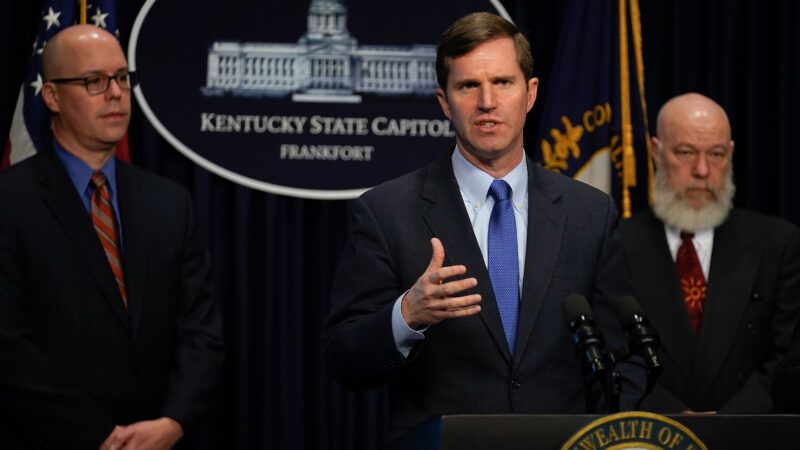SCOTUS Declines To Let Kentucky Religious Schools Reopen Without Addressing the Constitutionality of Closing Them
The justices emphasized that K-12 schools are currently scheduled to reopen after winter break.

The Supreme Court yesterday declined to intervene on behalf of Danville Christian Academy, which challenged Kentucky Gov. Andy Beshear's pandemic-inspired closure of K-12 schools. The Court emphasized that Beshear's November 18 order expires soon with the beginning of winter break, after which schools currently are scheduled to reopen. The Court left open the possibility that Danville Christian Academy could renew its challenge if Beshear, a Democrat, extends his order into the new year. Justices Samuel Alito and Neil Gorsuch dissented from the decision, noting that Beshear could avoid Supreme Court review by issuing a series of temporary orders that would have the same effect as a long-term closure.
Unlike New York Gov. Andrew Cuomo's restrictions on houses of worship, which the Court overturned last month as a violation of the First Amendment's Free Exercise Clause, Beshear's order does not explicitly discriminate against religious activities. But Danville Christian Academy, joined by Kentucky's Republican attorney general, Daniel Cameron, emphasized that the governor, while closing religious schools, is allowing many secular activities that pose similar or higher risks of virus transmission.
U.S. District Judge Gregory F. Van Tatenhove, who last month issued a preliminary injunction allowing religious schools to open, found that argument persuasive. "This court wonders why, under this executive order, one would be free to attend a lecture, go to work or attend a concert, but not attend socially distanced chapel in school or pray together in a classroom that is following strict safety procedures and social distancing," he wrote.
Four days later, the U.S. Court of Appeals for the 6th Circuit imposed a stay on Van Tatenhove's injunction pending resolution of the case. Cameron and Danville Christian Academy asked the Supreme Court to lift that stay.
"The Order applies equally to secular schools and religious schools, but the applicants argue that the Order treats schools (including religious schools) worse than restaurants, bars, and gyms, for example, which remain open," the Court notes. "For the latter reason, the applicants argue that the Order is not neutral and generally applicable." The Court has said the Free Exercise Clause does not require religious exemptions from neutral, generally applicable laws. But it also has said laws are presumptively unconstitutional when they discriminate against religion.
The Court declined to get involved in the dispute for the time being. "Under all of the circumstances, especially the timing and the impending expiration of the Order," it said, "we deny the application without prejudice to the applicants or other parties seeking a new preliminary injunction if the Governor issues a school-closing order that applies in the new year."
In a dissent joined by Alito, Gorsuch notes that Beshear, while forbidding in-person primary and secondary education, "permitted virtually all other in-person activities to continue with only capacity restrictions." For example, "Movie theaters, indoor wedding venues, bowling alleys, and gaming halls remained open for business." Such distinctions are hard to justify on scientific grounds, especially given the lack of evidence that K-12 schools are an important source of virus transmission. Gorsuch says the 6th Circuit erred by failing to "address the plaintiffs' argument that the two [executive orders], considered together, resulted in unconstitutional discrimination against religion."
Gorsuch says Beshear should not "be able to evade judicial review by issuing short-term edicts and then urging us to overlook their problems only because one edict is about to expire while the next has yet to arrive." He notes that "the Governor has expressly told us that he reserves the right to issue more decrees like these if and when religious schools try to resume holding classes."
In a dissent joined by Gorsuch, Alito notes that the Court's order is "based primarily on timing" and argues that "it is unfair to deny relief on this ground since this timing is in no way the applicants' fault." The plaintiffs filed their lawsuit on November 20, two days after Beshear issued his order, and sought the Supreme Court's intervention on December 1, two days after the 6th Circuit issued its stay. "It is hard to see how they could have proceeded more expeditiously," Alito writes.
The Court's order does not address the merits of the plaintiffs' claims, and it may yet have an opportunity to do so, depending on whether Beshear actually allows schools to reopen in January. In addition to the issue of whether his policy is neutral and generally applicable, the case raises the question of whether it is unconstitutional in any event because it not only burdens religious freedom but also impinges on the rights of parents to direct their children's education.

Show Comments (43)